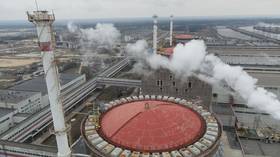Europe's largest Nuclear Power Plant attacked by Ukraine

Europe’s biggest nuclear power plant has been attacked by three ‘kamikadze drones’ belonging to the Ukrainian armed forces, Russian media has reported, citing local officials.
According to statements, Zaporozhye Nuclear Power Plant, located in southeastern Ukraine but under the control of Moscow’s forces, has not been damaged and its reactor was not impacted by the attack.
The radiation background is normal and it is constantly being monitored, Vladimir Rogov, a member of the Zaporozhye Region military-civil administration, told Tass news agency.
This is not the first time the NPP has been targeted by the Ukrainian military. On July 12, Ukrainian UAVs dropped several 120mm shells on a building located next to the power plant, causing damage to its roof and window, the press-service of the Energodar city administration told RIA Novosti. According to the spokesperson of the administration, 11 employees were injured during that attack, with four of them remaining in serious condition.
Russia currently controls the southern and central part of the Zaporozhye region, including the city of Energodar, where the biggest nuclear plant in Europe is situated. The administrative center of the region, Zaporozhye, remains under Ukrainian control.
Russia sent troops into Ukraine on February 24, citing Kiev’s failure to implement the Minsk agreements, designed to give the regions of Donetsk and Lugansk special status within the Ukrainian state. The protocols, brokered by Germany and France, were first signed in 2014. Former Ukrainian President Pyotr Poroshenko has since admitted that Kiev’s main goal was to use the ceasefire to buy time and “create powerful armed forces.”
In February 2022, the Kremlin recognized the Donbass republics as independent states and demanded that Ukraine officially declare itself a neutral country that will never join any Western military bloc. Kiev insists the Russian offensive was completely unprovoked.












